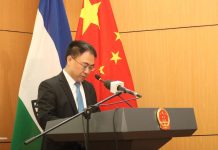Africa-Press – Lesotho. Public Eye last Thursday had an opportunity to meet with the newly-appointed Prime Minister, Dr Moeketsi Majoro (MM), to discuss a wide array of issues ranging from his government’s mitigatory measures towards the COVID-19 threat, pervasive poverty, coalition politics, security sector threat, decentralisation and other pertinent issues the country is grappling with.
Below are excerpts of the interview with Public Eye Chief Sub-Editor Mordekai Musundire (PE).
PE: You said tackling coronavirus is your number one priority on your to-do list.
True to your word we saw you visit the quarantine facility in the company of your deputy. There is the nagging reality of porous borders allowing undocumented movement in and out of the country.
Do you have tangible plans to roll out extensive testing around the country? Where will you get the resources given the current budget had obviously not factored this in? Shortage of PPE, particularly for health workers at the coalface of the pandemic is also worrisome, what are you planning to do about it?
MM:
I want to play a leading role in stopping the spread of the virus and mitigating the impact of VOVID-19 by promoting appropriate interventions. The lockdown impacts the economy badly.
I have tasked the ministers to review the effectiveness of the National Command Centre and to restructure it to increase its efficacy in addressing the challenge.
As we speak, a review is underway to set up a more nimble and effective structure which should be aligned with the disaster management and public health legislation in place.
My aim is to secure an appropriate structure with which to combat the virus and especially its impact on livelihoods and the economy. The virus affects countries differently. There are pertinent questions that need to be answered.
For example, should we test every Mosotho at random at the cost of at least M500 per individual? Whatever we do going forward: whether we fumigate public places, or institute compulsory wearing of masks, or carry out extensive testing will depend on the better information that the new structure should be able to produce.
In two weeks time, I will have an answer to some of these questions regarding COVID-19. The issue of PPE is one that my government takes seriously. Thankfully, it will be taken care of especially because our various development partners have generously intervened and have come on board to help us fight the virus.
The European Union, the United States of America, the People’s Republic of China, and the Global Fund, Mr Sam Matekane, Mr Nthane, and many Basotho investors and entrepreneurs have come to the party with generous contributions.
But we need a lot more from them and we are also exploring opportunities for debt suspensions as part of plans to mitigate the effects of the virus on the economy.
PE: Lesotho recently upgraded to the lower middle-income status.
Some would say this is a disadvantage because it puts the country in the league of richer countries which do not really attract assistance from donors and other development partners. What can you say about it?
MM:
On the contrary, I would say it is a good thing. Moving up means more opportunities as it puts Lesotho in the league of bigger boys, literally. In any case, the benefits of staying in the pool of poor countries are not as huge as people assume.
The amounts of money could be as little as £15 million over a three-year period. The World Bank Group and the African Development Bank have special facilities for poor countries but the benefits of going up the ladder of development far outweigh the perceived handouts under these facilities.
PE: You promised, as your second priority, more food parcels for vulnerable households after which you will step up agricultural production.
Briefly summarise the blueprint on your table towards achieving this goal.
MM:
COVID-19 comes on top of a drought. From last year, estimates were that about 500,000 of our people were food insecure. Although I do not have statistics off-the-cuff, I am sure the number of Basotho who are now food insecure has probably risen to 700,000 or more because of the impact of the lockdown.
Government must continue to provide foodstuffs for the poor. I have tasked the Minister of Social Development, along with the Disaster Management Authority to identify all vulnerable families and distribute food to them.
They started this exercise last month in collaboration with local authorities. However, I must point out that we now have a slightly different focus, which is the urban poor.
Traditionally we have always assumed rural communities are the most vulnerable but with the loss of income induced by the lockdown, we have realized the need to assist the urban poor more, at least until people get back to work.
We will similarly assist vulnerable rural households until the next harvest but our ultimate aim is to work on a more robust food production programme and ensure comprehensive tillage of arable land.
PE: Youth unemployment has been on the lips of your predecessors Dr Pakalitha Mosisili and Dr Motsoahae Thabane without much impact on the ground.
You have also made it your third most important priority in the short term. What is it that you intend to do differently?
MM
: Solving youth unemployment is no rocket science. It obviously calls for increased investment and, by the way, it is not really the government’s business to invest and run businesses.
Instead, our role as government is to facilitate and create an enabling environment for jobs to be created. For instance, in agriculture we should really attempt optimal use of all arable land in the country and jobs will be created in the process in all facets of agriculture.
But it is farmers that must undertake the investments. The wool and mohair sector should work like an industry and we need to overhaul it and ensure that farmers get the lion’s share of their produce and not the middle men and their brokers.
As the facilitator, the government should remove hurdles and roadblocks, while the private sector should focus on entrepreneurial pursuits. The ingredients are there and our farmers have what it takes to produce food, but not necessarily the ability to navigate the entire value chain of business.
For example,
Semongkong farmers produce some of the best potatoes you can have but do they have the capacity to negotiate a meaningful contract with Shoprite or Pick ‘n Pay? The question of capacity is also a handicap among our farmers because while our farmers can produce to expected standard, the scale is often too little to secure sizable contracts in commercial markets.
Government could promote more of block farming engagements and contract farming and help capacitate farmers so that a farmer can produce up to four times from the same plot of land.
PE: Corruption has been festering for years and Basotho are largely disillusioned and wondering if there is sufficient political will to tackle it.
How do you intend to tackle corruption in a way that would inspire confidence among Basotho, a majority of whom have given up hope that corruption will be meaningfully addressed?
MM:
I am equally unhappy with the levels of corruption in our midst and I am mindful that there is a pervasive perception that our society is very corrupt.
My take is that we need to deal with the underlying factors feeding that perception. Corruption works together with other ills like money laundering, fraud and other white collar crimes. These crimes are very sophisticated accounting financial events.
The question is: Do we have the appropriate capacity in our judicial agencies to investigate sophisticated crimes thoroughly since part of white collar crime needs investigators with skills and experience in auditing and accounting? To illustrate the problem of capacity; a company is convicted in Israel for bribing people in Lesotho, but the Lesotho judicial system is incapable of convicting the same people in Lesotho! To fight graft you need to deploy the right skills and establish significant deterrence and corruption should, for instance, be seen as irredeemably damaging to one’s reputation.
I believe this can be done. The greatest, long-term and sustainable weapon in fighting corruption is the intangible or unquantifiable grooming of society from childhood. This is not a task for government alone but society at large. Imagine our nation has more than 200 000 double orphans out there raising themselves.
The question is who is grooming them ethically? Traditional mores among Basotho dictated that a parent was a parent for every child in the community even if they are not the biological parents. But that practice has disappeared.
MM: When one looks at all the three previous coalition governments, the common denominator underlying their downfall has been the inherent complexity of reconciling diverse political interests.
The first coalition had three parties, the next had seven, the recently collapsed coalition had four parties and your government comprises nine parties. What is your game plan to keep the parties united and steer steer clear of rocking the boat again?
MM
: There are no clear answers to this question and I cannot necessarily promise that this coalition will not go the same way as previous ones.
However, I am fortunate to have lived through the factors that led to the dissolution of the previous coalitions. Every Mosotho has his or her own views about what led to the collapse of previous coalitions and I am no exception.
They all follow a pattern: they start well with the requisite consultative approach but politics and the call of the next election begin to put pressure on the bond, progressively weakening collaboration in the process.
Parties start wanting to outdo each other by each creating a silo which only a particular party can claim. Divisions start to show while petty jealousies set in.
To complicate matters, each party inherently has a core of trusted individuals who in most cases are an unelected group with the advantage of easy access to the centre of power.
The largest party in a coalition has greater responsibility to enforce consultation, while smaller partners are extortionist by nature since they really have little or nothing to lose.
In the end it is a zero-sum game where you have to give and take and I, alone, can’t avoid an implosion even if I may know the errors. Members feel entitled but excluded and in most cases such backbenchers win the day.
Ultimately, it has always been backbenchers who call the shots. They are the ones that have brought down all the previous coalitions. They are ignored at the peril of all future coalitions.
PE: The security cluster in general, and the army in particular, has been at the centre of political discord after proving to be the “real centre of power” in Lesotho politics over the years.
Lately, this sector has been quieter. Can we safely say we are out of the woods?
MM:
It is too early to say. The security sector is not yet fully perfected or cushioned from undue political interference. I believe this will take time but then again remember soldiers do not go out to look for politicians, it is the the politicians that go hunting for the security forces. I want to warn my colleagues to stop interfering with the judicial and security forces. This is all I can say at this stage.
PE: As the economy continues to struggle, some have suggested austerity measures could also include trimming of foreign missions.
Do you have such plans on the table?
MM:
My short answer to your question is whatever decisions we are going to make, it is unlikely we will increase foreign missions.
PE: Decentralisation has been on the lips of many policymakers before you but we are yet to see any results on the ground.
What is your take on this issue?
MM:
There is a palpable frustration, which I share, that decentralization has been extremely slow in Lesotho. I share the view that we need to devolve power and functions of central government.
I subscribe to subsidiarity as a developmental paradigm which we need to pursue vigorously. Decision-makers must be closest to the people for whom decisions are made. Investment, education and health in Quthing are best decided and tailored by people in Quthing, not in Maseru.
Spirited devolution talk has indeed been on since 2005 but actual devolution has been very slow and this has compromised the quality of life of our people throughout the country. We are too centralised and continue to withhold power in Maseru at the expense of the rest of the country and this needs to be fixed.
PE: Until a few years back, there was a lot of hype about digital migration which the nation was made to understand would create broader bandwidth which means, for instance the airwaves would be able to accommodate more television stations which, in turn, would give talented Basotho the platform to exercise their talents in arts thereby creating much-needed jobs.
Lately, there has been dead silence on the matter, what is happening?
MM:
My view would be Lesotho Television (LTV) and the like need to be supported. In order to create more jobs in the arts and media sector perhaps a policy putting local content at the centre could help.
There is a diversity of talent which is dormant which means we are actually penalising and stifling creativity by continuing to push a single, underfunded public broadcaster. We would want to see more private players taking part. However, there are uncomfortable questions we need to address first.
For example:
Which sections of our society watches LTV the most? Do all the audiences have access to the television? Is it not a case of LTV being absent where it is needed most and present (in urban centres) where audiences are spoilt for choice and have access to various alternative media? Another difficult question is: How much of our intended audience has shifted more to social media and self-publishing or self-broadcasting online? I think we need clearer answers before we make any further steps.
For More News And Analysis About Lesotho Follow Africa-Press






